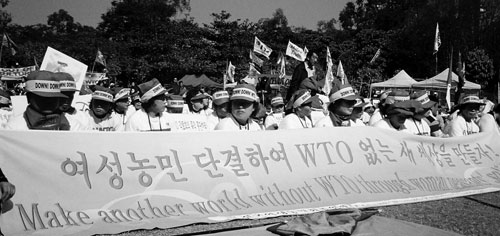What are we going to eat? Gold or Diamonds?
In December, 2005, indigenous Asian communities from the most marginalized scapes took to the streets to reclaim their livelihoods and eco-culture, redefining food sovereignty and environmental space for themselves. The resistance from the peripheral grounds against the Sixth Ministerial Conference (MC6) of the World Trade Organization (WTO) was the essence of decentralized grassroots small movements.
For more than the past decade, the WTO has deprived women of their indigenous sovereignty over small-scale local production. The destruction of small agriculture and aquaculture by the WTO’s neoliberal agenda has contributed to the feminization of both domestic and international migration that sustains wage-slave conditions on women. Yet, through the eyes of these indigenous Asian women and migrant workers struggling for their cultural livelihoods, one actively renews the hope of the everyday grassroots struggle of the least privileged. Empowering women and society through rejuvenating autonomous sovereignty over environment, land, food and water, MC6 resistance sets forth a cogent message on the competence of poor women of colour and their indigenous skills.
Women Pay the Price of International Agreements
As the WTO further entrenches the privatization of local frontiers, it creates a socio-economic environment that prevents the cultivation of indigenous livelihoods across Asia. Women, whether from South Korean rice farms, Indonesian aquaculture or Filipino fisheries, are faced with eco-cultural exploitation. Quite contrary to the so-called development agenda, the WTO breeds a polluted environment of poverty and oppression on women through the dynamic stratification of bilateral and multilateral agreements.
By cutting state subsidies in the global South, the Agreement on Agriculture (AoA) is suffocating small, local agricultural industries, while the U.S. and EU continue to provide subsidies to agribusiness corporations. Liberalized trade has created an impossible market for local production. Communal food self-sufficiency and local trading of indigenous rice and vegetables are eradicated with commercial dumping from the West.
The seeds of life and food sovereignty are lost to the General Agreement on Trade Related Intellectual Property Rights (TRIPS). Where thousands of indigenous rice varieties had been used in the sustainable evolution of small-scale production that meets local ecological demands, fast-growing genetically modified crops have entered the scene of commercial production. The long-standing characteristic of indigenous women’s seed sovereignty is lost to monopolies.
However, women’s social-justice issues do not stop at an analysis of merely the AoA or TRIPs. The General Agreement on Trade in Services (GATS) covers over 160 service sectors, from childcare and education to water use and sanitation. Through progressive liberalization and promises of economic “development,” surviving water sovereignty in the public sector flows down dreadful corporate streams into the coffers of transnational private companies. As governments reduce their commitments to public-service provisions, women pay the biggest price to meet demands of affordable water.
The adverse effects of privatization through GATS inevitably destroy small producers, as poor communities can no longer access the commercialized water supply. In the area of aquaculture and non-agriculture market access (NAMA), many Indonesian and Filipino women have to leave behind their indigenous fisheries. The WTO’s promotion of commercial shrimp degrades essential coastal ecosystems, like mangrove forests, that maintain local biodiversity and small aquaculture. Environmental destruction places a burden on women to meet the challenging demands of deteriorating conditions for indigenous aquaculture.
The erosion of communal practices and its impact on women because of WTO policies is multi-dimensional. From the loss of organic farmland in South Korea to victims of landslides in Indonesia due to industrial eucalyptus plantations, the WTO has anchored unbearable conditions for low-income women. Food self-sufficiency, originally maintained by communal sovereignty and local biodiversity, is replaced by sex work and wage-slave labour.
Turning Women Into Commodities
“The poor are getting poorer, we, we, we! The rich are getting richer, you, you, you!” is an Indonesian song chanted by domestic maids in Hong Kong. It expresses the suffering of poor women of colour affected by the WTO.
The complexity of neoliberal policies kills indigenous ecological livelihoods, shaping the feminization of migration, where women look for survival elsewhere. The WTO turns women into commodities, sold on profit-driven markets around the world. Women experience the harsh reality of the socio-ecological failures of the free market and privatization every day as migrants and sex workers.
“From Indonesia, migrants come here [Hong Kong] because our families are farmers and fisher-folks. If we can do our work at home, we don’t need to come to another country,” explains Mia Sumiati of the Hong Kong Coalition of Indonesian Migrant Workers Organization (KOTKIHO). Sumiati is an Indonesian domestic maid who had to leave her hometown and family livelihood because of the WTO. When not catering domestic services, Sumiati volunteers to provide for homeless shelters for Indonesian maids who leave abusive employers or who do not have a place to stay.
Despite popular notions of better living standards and exotic lifestyles in industrialized cities, migrant work is anything but luxurious. Eni Lesteri was 19 went she left Indonesia to come to Hong Kong as a domestic maid. “Most of us, migrant workers, are women. We are victimized,” says Lesteri, spokesperson for the Asian Migrants Coordinating Body. In Hong Kong, domestic maids work the longest hours, but make the lowest wages, at Cdn. $500 per month. Without protection, they must leave the country in 14 days if they lose their job. In desperate moves for survival, some migrant women are coerced into sex with men who promise to sponsor them in Hong Kong. But these young women are often abandoned, impregnated. “Governments never promote people welfare, only corporate welfare. Migrant women are the most vulnerable. Our suffering is double,” Lesteri says.
Lestari describes the reality of indigenous destruction in Indonesia: “My family was forced to sell land because of WTO policies. But we still couldn’t repay the debt, making me leave [my] hometown. Although we want to go home, migrant work is our only choice for survival.” WTO policies in agriculture, services and industries construct the bases of displaced labour, broken families, landless peasants and torturing conditions for women. A struggle for life means an everyday struggle against the WTO.
WTO Meets Indigenous Resistance
Diverse coalitions of peasants, sex workers and domestic maids performed a women’s solidarity march and bestowal towards the WTO during its December conference in Hong Kong, delivering a monstrous pepper pig-stomach soup as a cure for the cold-blooded exploitations of WTO’s policies. A guilty verdict was executed at the Asian Women’s Tribunal, where the WTO was put on a political trial for crimes committed against women’s lives and livelihoods. With a playful yet vital denunciation of the use of pepper spray by the Hong Kong police, women asserted their rights to food sovereignty, with the reminder that “pepper is for soup, not for abuse.”
Indigenous communities, most vulnerable to WTO policies, collided against the free-trade and liberalization agenda of the WTO at many locations, further derailing the train of neo-colonial progress off the tracks at the so-called “Development Round.”
A wide range of tactics was used by the protesters, all of which were embedded in local cultures and practices. The South-East Asian Network of Fisherfolks took two small boats to the Hong Kong Convention and Exhibition Centre in order to fight for their livelihoods in aquaculture. Cultural art reclaiming women’s rights to food sovereignty and water sovereignty was strongly visible in the peasant resistance. Varieties of indigenous beats, celebrating the small farmers’ harvest with Korean drums, were performed by peasant women. The messages sent were clear: “Women are not for sale,” exclaimed the poverty-stricken, displaced migrant women. “Agriculture is our lives.”
Eni Lesteri believes the women and migrant workers made an important impact at the Hong Kong WTO conference. “The deal at MC6 is not really a deal, but some arrangements. Our protest is successful. WTO’s achievement is minimum.”

After MC6: What Are We Going to Eat?
The mainstream media and the WTO’s attempt to save face with a last-minute empty deal in Hong Kong hardly present the behind-the-scenes impact had by Asian indigenous mobilizations. Alongside the strategic direct-action tactics provoked by peasants from La Via Campesina and Korean Struggle Mission, poor women of colour significantly halted the advancement of WTO’s Doha Round in Hong Kong.
What MC6 got was an agenda and framework for upcoming meetings, not a real deal. The last-minute draft agreement is a sketchy attempt to further disguise the derailing of the WTO and to prevent the impression of it as a total failure. A wide range of agreements are yet to be worked out on the agriculture negotiations front – for example, tariff cuts to imports. Given the fast-approaching deadline (April, 2006) for the completion of the Doha Round and the far-ranging interests in agricultural trade among all the countries, there is strong hope among low-income communities for a failed Development Round, which will significantly propel the WTO to its death sentence for crimes committed against indigenous women and the poor.
On the other hand, if the Doha Round deal is completed and implemented, it would have a devastating impact on low-income communities and small producers. The agreed 2013 date to end export subsidies by the EU and the U.S. is merely a box-shifting approach. Fifty-five billion euros will continue in agricultural export aid through the Green Box that is not accounted for in the export subsidies. Commercial dumping of rice from rich nations will continue to benefit agribusiness corporations, resulting in further hunger, poverty and oppression in the global South. The spread of child sex work and wage-slave labour will be key consequences on local producers and indigenous women.
These events mark either a fight for life, or a surrender to indigenous genocide. “Our struggle against WTO is not yet over,” members of the Korean Struggle Mission proclaim. One hundred and eighty-eight Korean women peasants and migrant workers were arrested alongside another 900 anti-WTO protesters after shaking the fifth day of MC6 negotiations to a temporary halt on December 17. The arrested women peasants were slapped, humiliated with strip-searches, denied water and faced crowded conditions in detention rooms. Other hundreds of women from Southeast Asia faced threats of deportation, barely managing to escape. Migrants were discriminated against and were refused exit from the police enclosure area after the launch of chemical weapons and rubber bullets. Despite the challenges, the indigenous mobilizations and resistance against the WTO, based largely on experiential knowledge and daily survival skills, are women’s tools for the protection of communal livelihoods.
Mi-Sun Park, a South Korean peasant woman and wife of an anti-WTO political prisoner charged in Hong Kong, expresses the sorrow of indigenous families over the WTO. “I make my living as a farmer in Haman, Gyungsangnam province,” says Park. “Farmers in South Korea are being ‘murdered’ by governments and politicians who have opened the agricultural markets without considering our needs and concerns. [We want] to protect our rice farms and agriculture, which is the heart and soul of our life. If we kill agriculture, what are we going to eat? Gold or diamond?”
This article appeared in the March/April 2006 issue of Canadian Dimension (Women Speaking Out).









